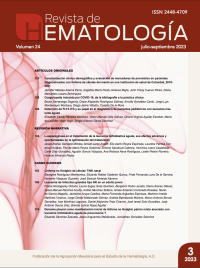L-asparaginase in the treatment of acute lymphoblastic leukemia, its adverse effects, and opportunities for treatment optimization.
Rev Hematol Mex. 2023; 24 (3): 145-162. https://doi.org/10.24245/rev_hematol.v24i3.9030
Jesús Alonso Gándara Mireles,1,6 Ismael Lares Asseff,1,6 Elio Aarón Reyes Espinoza,2 Lourdes Patricia Córdova Hurtado,2 Flor de María Reyes Gutiérrez,3 Antonio Sandoval Cabrera,3,4 Verónica Loera Castañeda,1,6 Carla Díaz González,2 Agustín García Vázquez,2 Ana Rebeca Nava Rodríguez,2 Leslie Patrón Romero,5 Horacio Almanza Reyes5
1 Instituto Politécnico Nacional, CIIDIR-Unidad Durango, México.
2 Centro Estatal de Cancerología, CECAN Durango, México.
3 Instituto Materno Infantil del Estado de México, México.
4 Facultad de Medicina de la Universidad Autónoma del Estado de México, México.
5 Facultad de Medicina y Psicología, Universidad Autónoma de Baja California, Tijuana, Baja California, México.
6 Red Latinoamericana de Implementación y Validación de Guías Clínicas Farmacogenómicas (RELIVAF-CYTED).
Resumen
El tratamiento contra la leucemia linfoblástica aguda ha mejorado a través de los años debido al desarrollo de estrategias de tratamiento cada vez más efectivas. La L-asparaginasa (L-Asp) es uno de los principales fármacos prescritos en el tratamiento de la leucemia linfoblástica aguda cuyo objetivo terapéutico es agotar sistemáticamente el aminoácido no esencial asparagina (Asp) y así causar la muerte de las células leucémicas; sin embargo, las reacciones de hipersensibilidad y la pancreatitis son los principales efectos adversos asociados con este medicamento. Se realizó una revisión de la bibliografía con base en la metodología Preferred Reporting Items for Systematic Reviews and Meta-Analyses en las bases de datos SCOPUS, Redalyc, SciELO, ScienceDirect, PubMed y BVS Medline, con el objetivo de describir los avances de L-Asp en el tratamiento de la leucemia linfoblástica aguda, sus efectos adversos y oportunidades en la optimización del tratamiento. En primera instancia se obtuvieron 607 artículos que tocaban aspectos de la L-Asp, se realizó una selección de 97 artículos que aportaban respuestas a nuestros objetivos. De acuerdo con esta revisión, la capacidad de individualizar la terapia, ajustar la dosis o cambiar la formulación de L-Asp puede ayudar a reducir los efectos adversos, así como a identificar a los pacientes con inactivación silenciosa y de esta manera mejorar la seguridad y eficacia en pacientes pediátricos con leucemia linfoblástica aguda en tratamiento con L-Asp.
PALABRAS CLAVE: L-asparaginasa; leucemia linfoblástica aguda; pancreatitis.
Abstract
Treatment of acute lymphoblastic leukemia has improved over the years due to the development of increasingly effective treatment strategies. L-asparaginase (L-Asp) is one of the main drugs used in the treatment of acute lymphoblastic leukemia whose therapeutic objective is to systematically deplete the non-essential amino acid asparagine (Asp) and thus cause the death of leukemia cells; however, the hypersensitivity reactions and pancreatitis are the main adverse effects associated with this medication. A review of the literature was carried out based on the Preferred Reporting Items for Systematic Reviews and Meta-Analyses methodology in Redalyc, SciELO, ScienceDirect, PubMed, BVS Medline and SCOPUS databases, with the aim of describing the advances in the treatment with L-Asp against acute lymphoblastic leukemia, its adverse effects and opportunities in treatment optimization. In the first instance, a total of 607 articles that talked about aspects of L-Asp were obtained, a selection of 97 articles that provided answers to our objectives of this review. According to this review, the ability to individualize therapy, adjust the dose, or change the formulation of L-Asp may help reduce adverse effects, as well as identify patients with silent inactivation and thus improve the quality of life, safety and efficacy in pediatric patients with acute lymphoblastic leukemia under treatment with L-Asp.
KEYWORDS: L-asparaginase; Acute lymphoblastic leukemia; Pancreatitis.
Recibido: septiembre 2023
Aceptado: octubre 2023
Este artículo debe citarse como: Gándara-Mireles JA, Lares-Asseff I, Reyes-Espinoza EA, Córdova-Hurtado LP, Reyes-Gutiérrez FM, Sandoval-Cabrera A, Loera-Castañeda V, Díaz-González C, García-Vázquez A, Nava-Rodríguez AR, Patrón-Romero L, Almanza-Reyes H. L-asparaginasa en el tratamiento de la leucemia linfoblástica aguda, sus efectos adversos y oportunidades en la optimización del tratamiento. Hematol Méx 2023; 24 (3): 145-162.

